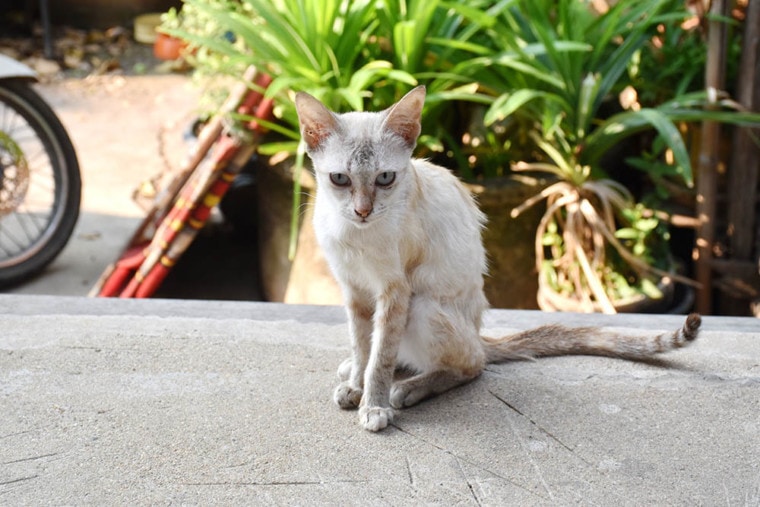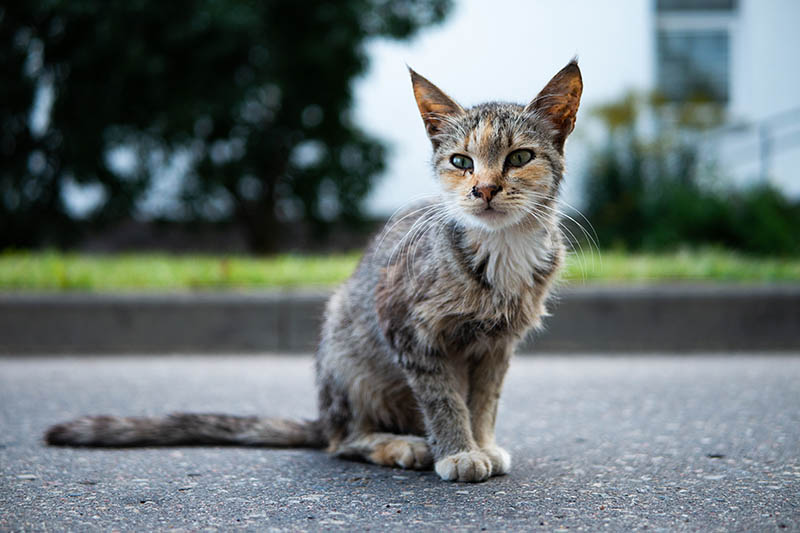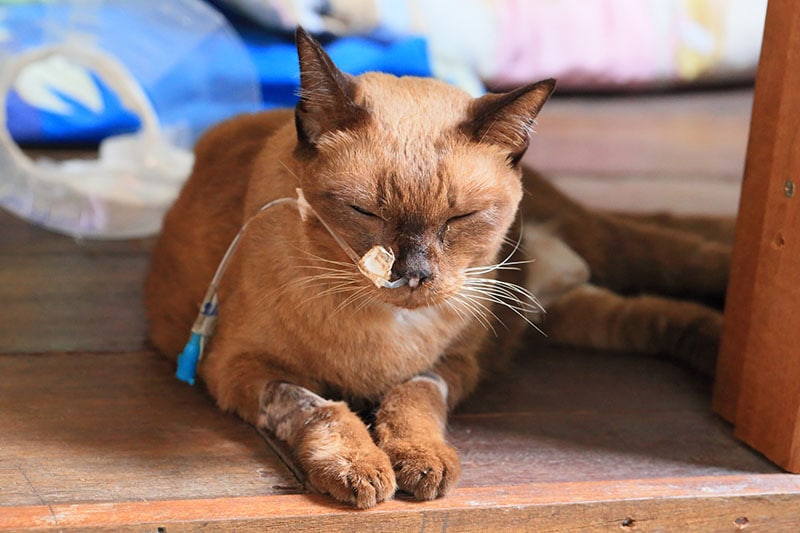
If you have an older cat that is losing weight, you’re probably worried about them. And rightly so. While weight loss is common in older cats, it’s not normal and often indicates an underlying health condition.
So, what health problems can cause weight loss in cats? How can you help your feline during this tough period?
Read on to learn about eight possible reasons that your feline is losing weight, how to recognize the signs of these issues, and how to help your feline maintain a normal weight.
The information in this article was approved by a veterinarian but is not a replacement for the veterinary clinical exam and diagnostic process. If your cat is losing weight, they should be examined by the vet promptly so they can receive appropriate treatment in case of an underlying medical condition. These are just some of the possible causes of weight loss in older cats.
The 8 Vet-Approved Reasons Why Older Cats Lose May Weight
1. Chronic Renal Disease (Chronic Kidney Disease)
Chronic renal disease, also known as chronic kidney disease (CKD), is a common condition in older cats; it represents a persistent kidney function loss, which can cause multiple health issues for your feline. Cats that suffer from CKD experience a buildup of various harmful compounds in their bloodstream, which leads to several problems, often manifesting as:
Unfortunately, there’s no way to cure CKD, so felines suffering from this problem can never become fully healthy. However, with proper treatment, regular veterinary check-ups, and monitoring, your cat could live a fairly normal, comfortable, and long life.
The treatment for CKD typically includes dietary changes, the most important aspect in disease management, as well as medications, depending on each individual case, to help control elevated blood pressure, minimize protein in the urine, manage appetite, and help with anemia. Speak to your vet if you think your cat may be suffering from kidney disease.
2. Diabetes Mellitus
Another common reason for older cats to lose weight is diabetes mellitus. This condition can affect cats of all ages, but it’s especially noticeable in middle-aged and older cats. There are three different types of diabetes mellitus:
- Type I — This type is quite rare in cats.
- Type II — This is the most common type of diabetes in cats, and it’s typically triggered by obesity.
- Type III — This type is less common in cats; it usually occurs due to hormonal changes happening in your feline’s body, often associated with hormone-secreting tumors.
When a feline has diabetes mellitus, their body is incapable of regulating glucose levels, which may lead to several clinical signs, including:

Fortunately, diabetes mellitus is a manageable condition in cats, though it will require your determination and persistence. The initial step in helping a cat with diabetes mellitus is to remove the potential predisposing causes for diabetes and for your vet to rule out any concurrent disease.
In most cases, your vet will recommend a diet change, regular blood glucose checks, and once or (more often) twice daily insulin injections, and you’ll need to monitor your feline’s progress and consult your vet if any changes occur. Don’t worry, your vet will explain everything and provide basic training for you to be comfortable administering insulin and sometimes even checking your cat’s blood glucose at home.
3. Hyperthyroidism
If you’ve recently noticed that your older cat is losing weight but they have a normal or even increased appetite, your feline may be suffering from hyperthyroidism. This is a common condition in cats that are over 8 years old, with an average age of 12 years old; it occurs when your feline’s thyroid gland produces more thyroid hormone than it’s supposed to.
Common signs of hyperthyroidism in cats include:
This condition develops gradually, so it can be challenging to notice all the signs. However, you should observe your feline and take them to the vet if you notice any of them. Leaving hyperthyroidism untreated for a long time could lead to other health problems, such as heart disease and hypertension, which is why it’s crucial to react promptly and help your feline.
There are several possible treatment options, depending on each individual cat. They include oral treatment, radioactive iodine therapy, prescription nutrition, and surgery. Your veterinarian may prescribe lifelong oral treatment that contains methimazole for your cat to treat their hyperthyroidism if they deem it as the most appropriate option. However, as with many other medications, these drugs in rare instances can cause certain side effects that may lead to other health problems, so remember to be cautious during this period and strictly follow your vet’s advice. They will recommend having your cat seen regularly for checkups and blood tests to make sure they are tolerating the treatment well.
4. Inflammatory Bowel Disease
If your older feline is losing weight, they might be suffering from inflammatory bowel disease. This condition is common in middle-aged and older cats, and it affects your cat’s gastrointestinal tract and causes inflammation and irritation. This leads to your feline’s GI walls becoming thicker and losing the ability to properly absorb and digest food.
There’s still no evidence as to what causes inflammatory bowel disease, though most people believe that this condition occurs when there’s an abnormal interaction between your feline’s:
When a feline is suffering from inflammatory bowel disease, they will likely experience the following signs:
As the signs of this health condition are similar to those of many other feline health problems, it’s best to consult your vet if you notice any of them, so your cat can undergo further testing.

If your feline is suffering from this disease, your veterinarian will probably prescribe medications and require you to make a change in your feline’s diet. Some felines may require corticosteroid treatments if other medications don’t work.
5. Dental Disease
Another common issue that can lead to weight loss in older felines is dental disease. Common variations include:
The problem with noticing a dental disease in your feline is that they typically don’t show any signs that you can closely track. Still, some felines suffering from dental problems will display signs like:
If your feline is suffering from dental disease, you’ll need to take them to a vet check-up to determine the precise variation that you’re dealing with. Most cases require a thorough dental assessment, under anesthesia, with teeth cleaning, radiography, and sometimes extractions, depending on the type and level of disease. There are also medications such as painkillers, anti-inflammatories, and antibiotics that your vet may prescribe if deemed necessary. Regular oral hygiene is important, so speak to your vet about brushing your cat’s teeth.
6. Cancer
It’s common for many older cats to experience weight loss due to cancer, and there are various types that your feline could have. This type of health problem is especially common in older cats.
Lymphoma is the most common type of cancer that affects cats, and it presents several clinical signs, including:
Another common cancer in cats, squamous cell carcinoma, often affects the cat’s mouth, and has similar signs, including:

If your veterinarian confirms that your feline has cancer, they will determine what type of treatment is available for your feline. Each type of cancer is different, so the treatment will depend on what your cat has and its development stage.
7. Arthritis
A common condition that affects older cats and can eventually lead to muscle wastage and consequent weight loss is arthritis. This degenerative condition leads to painful joints and makes moving uncomfortable.
Common signs of arthritis in cats include:
If you suspect that your feline may have arthritis, it’s best to visit your vet for further testing and possible treatment options.
Unfortunately, there’s no cure for feline arthritis. However, you can help your cat and make their life slightly easier by making environmental and dietary changes, while your vet can prescribe painkillers and anti-inflammatories. You’ll be able to ease their pain and make their life more comfortable.
8. Pancreatitis
If you notice that your older cat has suddenly lost weight, they might be suffering from pancreatitis. There are two different types of pancreatitis that your cat may experience:
Cats suffering from pancreatitis will experience the following signs:
The treatment for pancreatitis will depend on the severity of the condition. Treatment focuses on management of dehydration, lack of appetite, nausea, pain, and nutrition.
Most of the time, your vet will administer intravenous fluids and anti-nausea medication and provide nutritional support. In cases with concurrent disease, anti-inflammatory medications, analgesics, and antibiotics are also considered. Some cats that suffer from this condition may end up hospitalized for a couple of days to receive IV fluids and medications. In some cases, pancreatitis can be quite severe and even life-threatening, so prompt treatment is crucial.
Conclusion
If you notice gradual or sudden weight loss in your older feline, look for other signs that indicate that your feline is experiencing a particular health problem. Speak to your vet as soon as possible, as some of the reasons for weight loss in cats may be quite concerning and even dangerous. The sooner your cat receives appropriate treatment, the better it is for their health long term.
Featured Image Credit: Benchamaporn Kanlapungha, Shutterstock







